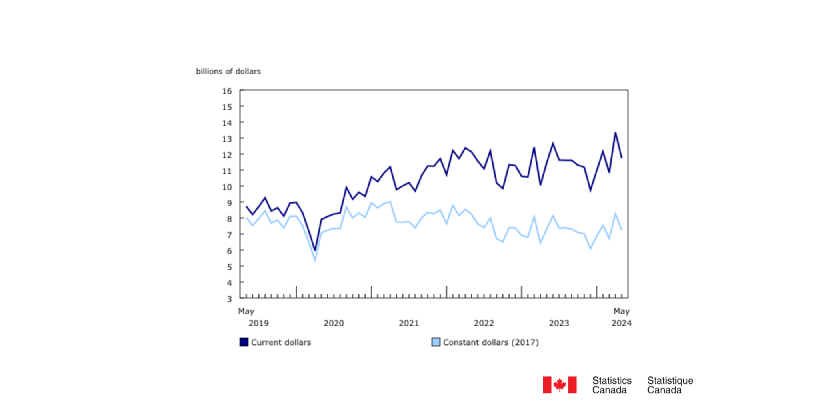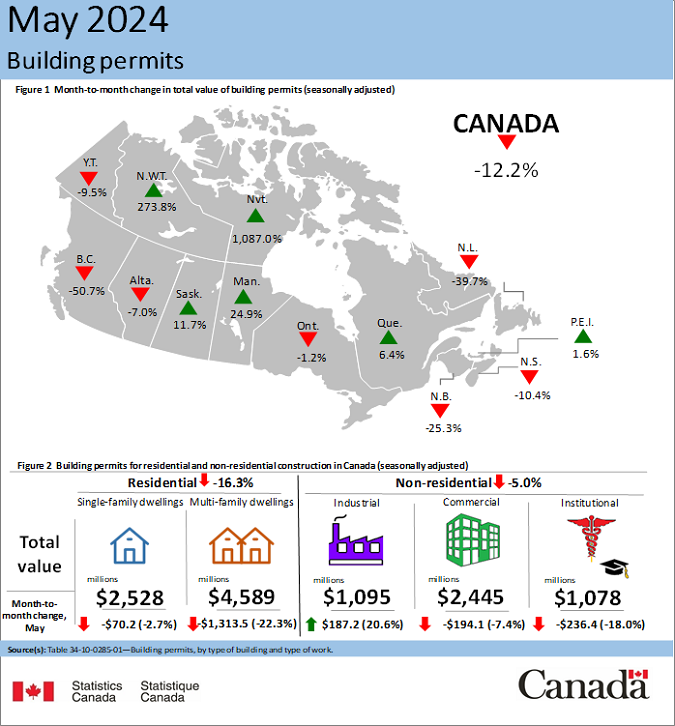BC Weighs Markedly on the Decline in Total Residential Construction Intentions in May

July 15, 2024
In Canada, the total value of building permits was $11.7 billion in May, down 12.2% from a record high of $13.4 billion in April. British Columbia led the national decline in May with a significant drop of 50.7% after experiencing a record high for the total value of building permits issued in April. Excluding British Columbia, the total value of building permits for the remaining provinces and the territories edged down 0.7% in May.
On a constant dollar basis (2017=100), the total monthly value of building permits declined 12.5% in May, following a 23.0% increase in April.
British Columbia weighs markedly on the decline in total residential construction intentions in May
The value of residential building permits fell 16.3% to $7.1 billion in May. British Columbia (-53.7%; -$1.1 billion) drove the decline in May following an unusually strong April, led by a record high value of multi-unit permits in the province.
Excluding British Columbia, residential construction intentions declined 3.8% for the remaining provinces and territories in May. Monthly declines were observed in Ontario (-7.9%; -$261.2 million), Alberta (-10.9%; -$122.4 million), and all three Maritime provinces (collectively down 4.5%; -$17.7 million).
Across Canada, 22,700 dwelling units were authorized in May, contributing to the 12-month cumulative sum of 267,600 units since June 2023.

Non-residential construction intentions decline, despite monthly growth in six provinces
The value of non-residential permits decreased 5.0% to $4.6 billion in May 2024. Declines in the institutional (-18.0%; -$236.4 million) and commercial (-7.4%; -$194.1 million) components more than offset growth in the industrial component (+20.6%; +$187.2 million).
Despite month-over-month increases in non-residential permit values in six provinces and two territories, the substantial decline in British Columbia (-44.1%; -$420.3 million) weighed heavily on the sector in May. Excluding British Columbia, construction intentions in the non-residential sector increased 4.5% month over month.
Issuance of permits for large new construction projects in New Brunswick led the province to a record high level for the commercial component ($65.3 million) and the third highest level in the series for the industrial component ($30.4 million) in May.
Go HERE for more information





![Guide to the Canadian Electrical Code, Part 1[i], 26th Edition– A Road Map: Section 56](https://electricalindustry.ca/wp-content/uploads/2022/11/Guide-CE-Code-2-768x432.png)




![Guide to the Canadian Electrical Code, Part 1[i], 26th Edition– A Road Map: Section 56](https://electricalindustry.ca/wp-content/uploads/2022/11/Guide-CE-Code-2.png)



